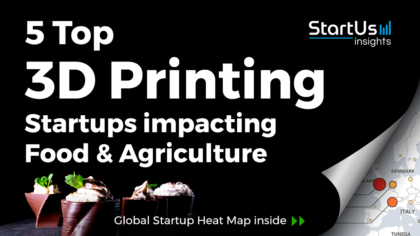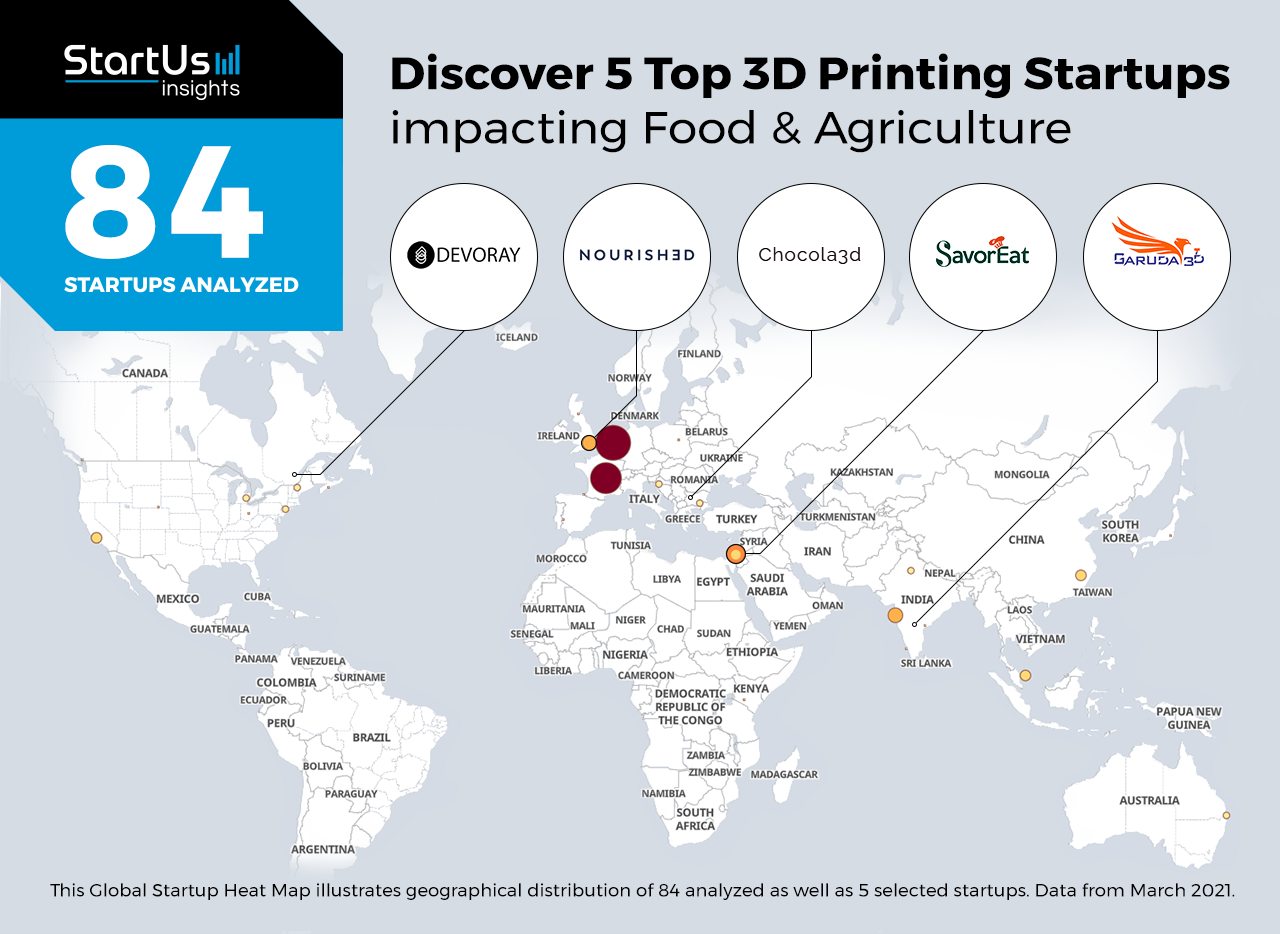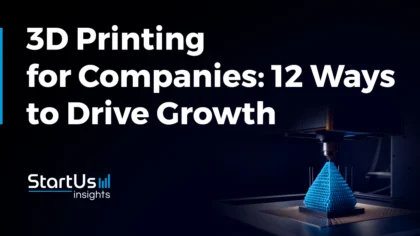Staying ahead of the technology curve means strengthening your competitive advantage. That is why we give you data-driven innovation insights into the food & agriculture industries. This time, you get to discover 5 hand-picked 3D printing startups impacting food & agriculture.
Global Startup Heat Map highlights 5 Top 3D Startups impacting Food & Agriculture out of 84
The insights of this data-driven analysis are derived from the Big Data & Artificial Intelligence-powered StartUs Insights Discovery Platform, covering 1.379.000+ startups & scaleups globally. The platform gives you an exhaustive overview of emerging technologies & relevant startups within a specific field in just a few clicks.
The Global Startup Heat Map below reveals the distribution of the 84 exemplary startups & scaleups we analyzed for this research. Further, it highlights 5 3D printing startups impacting food & agriculture that we hand-picked based on criteria such as founding year, location, funding raised, and more. You get to explore the solutions of these 5 startups & scaleups in this report. For insights on the other 79 3D printing solutions impacting food & agriculture, get in touch.
Garuda3D prints Hand Tools for Agriculture
Farming tools remove the drudgery in agricultural operations and also help complete field tasks faster and on-time. Different processes within agriculture require different tools to increase productivity on the farm. Additive manufacturing is gradually reaching farms, helping the sector increase productivity. It allows agriculture companies and farmers to build customized tools for their different farming needs.
Indian startup Garuda3D builds 3D printers to print hand tools. The startup’s 3D printing solutions assist farmers in developing various agricultural prototypes and production parts. It offers a 3D printed tri-claw fruit picker, shovel handle, garden hose splitter, drip irrigation structures, and sprinkler system. In addition to reducing costs, the startup’s tools also increase productivity in the agriculture sector.
Devoray specializes in 3D Food Printing
Changing consumer demand and unstable supply chains create challenges in the food and beverage (F&B) industry. Startups are integrating 3D printing for product development and production lines to optimize processes for the F&B industry. For example, such 3D food printers feature pre-loaded recipes that allow users to remotely create food. Moreover, this allows food developers to integrate food production with computers, smartphones, or internet of things (IoT) devices.
Canadian startup Devoray uses 3D printing to produce food in any shape. The startup offers a machine, as well as the necessary guidance, to print beverages ranging from cocktails to sports and nutrition drinks. By mixing alcohol and water with Devoray’s 3D printed ready-to-mix products, consumers are able to create beverages in as little as thirty seconds.
SavorEat develops 3D Printed Meat
Consumers are becoming more aware of the ecological and ethical impact of meat consumption. Consequently, they are looking for alternatives that provide the same taste without compromising on nutrient and protein consumption. To this end, startups and scaleups offer 3D-printed alternatives to meat.
Israeli startup SavorEat develops a plant-based meat alternative that possesses the same texture and taste as natural meat. The startup combines additive manufacturing with a robot chef to create dishes. It uses plant-based ingredients and provides the ability to cook or grill the product simultaneously with the printing process. In comparison to conventional cooking methods, this process improves the flavor profile of plant-based meat.
Nourished offers Customized Nutrition
Balanced nutrition is essential to remain healthy. However, today’s fast-moving lifestyle makes it difficult to maintain a balanced diet. Additive manufacturing offers ways to create food more efficiently while increasing the nutritional value. Startups already manufacture machines that print food, beverages, and pills on-demand. These machines comprise food-grade syringes or cartridges that hold real food items and deposit exact fractional layers to create a complete meal.
British startup Nourished provides freshly made vitamins using additive manufacturing. It encapsulates natural ingredients into a vegan hydrocolloid gel to offer tailor-made nutrition on-demand. The startup offers 30 different vitamins, minerals, and supplements to suit the needs of different consumers. For example, Nourished’s solution incorporates sweet, sour, or fruit flavors as coatings over their gummy vitamins stack. The coatings are also sugar-free, natural, and gluten-free.
Chocola3D enables Flexible 3D Food Printing
When it comes to food, customization is the key to gain a competitive edge in the industry. 3D printing saves both time and energy when it comes to experimenting with different types of food dishes. It also helps in creating intricate detailing to make the food look more appealing with less effort. Startups provide restaurants with food printers that create dishes according to a customer’s choice.
Bulgarian startup Chocola3D offers 3D printers that print chocolates, doughs, cheese, meat, vegetables, and fruit pastes. The printer nozzle’s diameter comes in 0.7 mm and 0.9 mm. The printers feature a flash drive and allow for remote control as well. With a printing speed of 50 mm per second, the startup provides chefs with the flexibility to experiment and create dishes more efficiently.
Discover more 3D Printing startups impacting Food & Agriculture
The 84 3D food printing startups, such as the 5 examples highlighted in this report, focus on alternative protein, 3D printed supplements, as well as personalized products or processes. While all of these technologies play a major role in advancing FoodTech, they only represent the tip of the iceberg. To explore more food technologies, simply get in touch to let us look into your areas of interest. For a more general overview, you can download our free Industry Innovation Reports to save your time and improve strategic decision-making.




![Additive Manufacturing Technologies: 10 Emerging Innovations [2025 & Beyond]](https://www.startus-insights.com/wp-content/uploads/2024/10/Additive-Manufacturing-Technologies-SharedImg-StartUs-Insights-noresize-420x236.webp)




